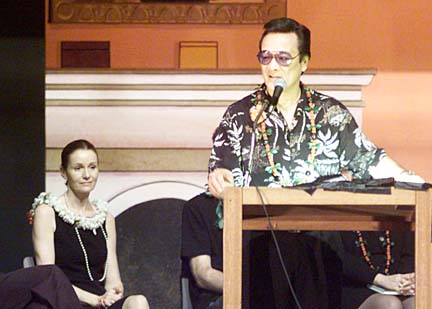


|
It was a delicious question, and one that continued to hang stubbornly in the air. McKay had many facets
By Scott Vogel
svogel@starbulletin.comWho was Gardner McKay?
Even if you attended Saturday's memorial service at Diamond Head Theater, chances are you're no closer to understanding the entire man than you were beforehand, his many lives stuffed willy-nilly into a body somehow capacious enough to contain all of them. And when the body finally gave out, on Nov. 21, McKay having suffered in the end with prostate cancer, the time must have seemed ripe to give a summation, to collect the facets and produce a coherent persona.
But McKay was something of a cypher to the end. To borrow a term from playwriting (one of McKay's several vocations), his life seemed to lack a through-line. Were Hollywood to acquire the rights to his story and give it the big screen treatment (which would be quite an irony in itself, given McKay's disdain for Tinseltown), the actor playing our hero would have no small task. And even if a Rosebud could be located, it most likely would not provide a very satisfying explanation. McKay's life, not unlike Charles Foster Kane's, could never be explained by a sled.
To some extent, one's view of McKay is determined by which reels of his personal movie you happened to catch. The early scenes are pure Hollywood hokum, the "actor, athlete, artist" (as Life magazine called him on its July 6, 1959, cover) leading an unremarkably bicoastal existence until the day when Dominick Dunne gave him the Lana Turner treatment, making an instant TV star out of the young man he'd discovered in a coffee shop.
Now he was Adam Troy, the dashing, impossibly chiseled captain of the schooner Tiki, sailing into millions of homes each week on ABC's "Adventures in Paradise." A show so colorful even the episode titles sounded exotic (e.g., "Nightmare on Napuka," "The Perils of Penrose," "Incident in Suva"), it wasn't long before the tabloids came calling, the aforementioned Life cover a chilling precursor of the People "Sexiest Man" covers of our own time.
"How about him, girls?" intoned the magazine under a giant photo of the starlet, declaring McKay "the new challenger for American good looks."
It was a challenge McKay apparently cared little for. In 1962, after ABC canceled his series, he left Hollywood, ignoring the pleas of no less a legend than Marilyn Monroe. Those days were documented in an essay he wrote called "Never Get Famous for the Wrong Reason," read by author Paul Theroux at Saturday's service.
Thus began the middle period of McKay's life, during which he wrote novels, plays, and drama criticism for the Los Angeles Herald-Examiner. Director William Scoular described his indebtedness to the playwright, who took a chance on him when few would. Terence Knapp began his tribute by reciting a passage from Shakespeare's "Cymbeline" and ended it with a powerful recitation of McKay's "The Hawk," which ends: "When all the hawks have vanished, what will the sky do for poetry?"
This was yet another question hovering over the proceedings, the crowd of more than 100 groping for words to describe a man who wrote short stories, performed on the radio, helped a complete stranger lay bricks to make a porch, and on and on. To one he was "the personification of a lost world." To another, he was a reminder -- apologies to Socrates -- that "the unlived life is not worth examining." To a third -- his literary agent, Roger Jellinek, most appropriately -- "he was serious about commas."
And to all, thanks to the enormous variety of his interests, he remained something of a mystery. To the end.
Click for online
calendars and events.